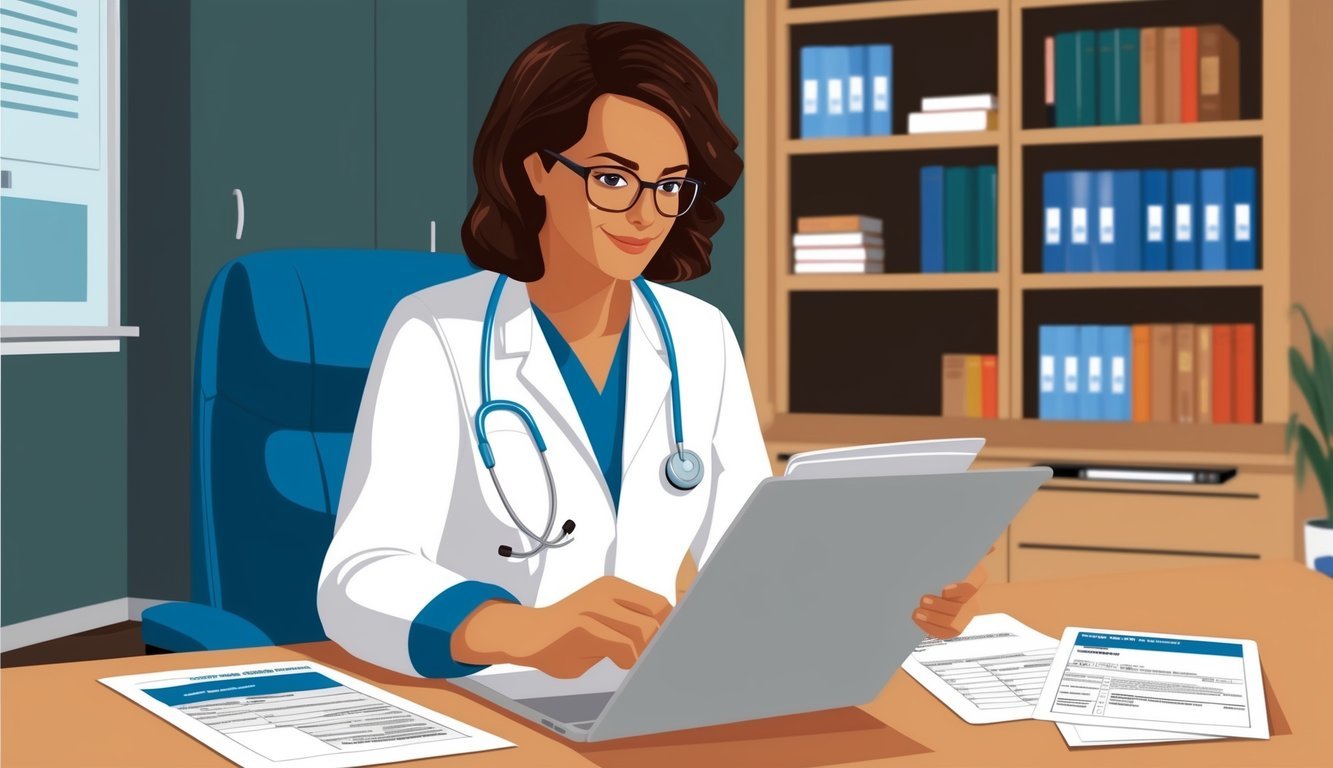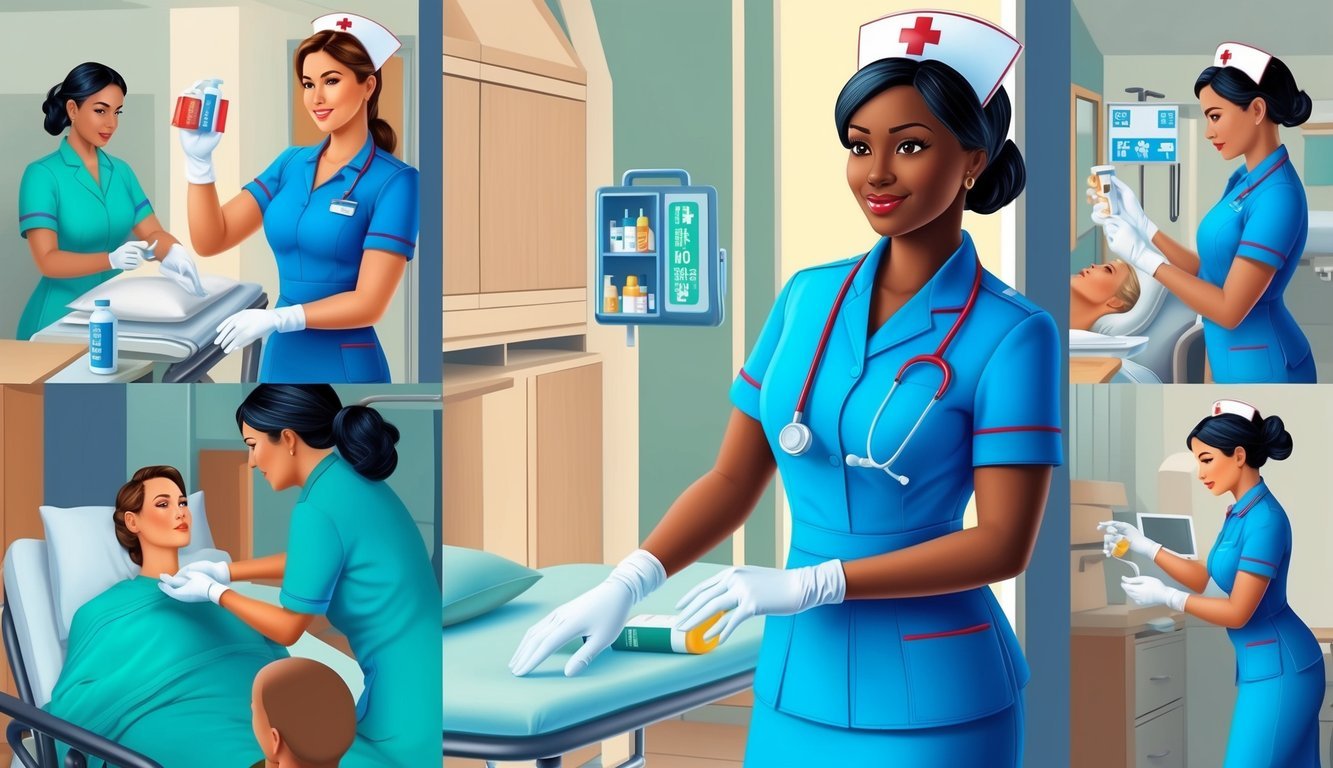Licensed Practical Nurses (LPNs) play a crucial role in healthcare, providing essential support to patients and medical teams.
Understanding the daily duties of an LPN helps you appreciate the skills and dedication involved in this nursing career.
From monitoring patient health to assisting with basic medical procedures, LPNs ensure quality care in various settings, such as hospitals and clinics.
As you explore the responsibilities of an LPN, you will see the importance of collaboration with other healthcare professionals.
This teamwork is vital for maintaining regulatory compliance and delivering effective patient care.
Additionally, LPNs must focus on continuing education to advance their careers and improve their skills.
With the right knowledge, you can make informed decisions about pursuing a career as a Licensed Practical Nurse.
Discovering the specific duties and opportunities available to LPNs will enable you to better understand this essential field of nursing.
Key Takeaways
- LPNs have specific duties that involve patient care and support.
- Continuously improving skills is important for LPN career growth.
- Collaboration with healthcare teams is vital for patient well-being.
Understanding the Role of an LPN
The role of a Licensed Practical Nurse (LPN) is vital in many healthcare settings.
You will perform various responsibilities to ensure the well-being of patients.
Your duties often depend on your work environment and the population you serve.
Scope of Practice
As an LPN, your scope of practice is defined by state regulations.
Generally, you can perform tasks such as:
- Administering medications
- Monitoring vital signs
- Providing basic patient care
You may also assist in procedures and manage patient records.
However, certain duties, like starting IVs or making critical decisions, may be reserved for Registered Nurses (RNs).
Understanding these limits is crucial for your professional development.
Your education and experience will also play a role in your specific responsibilities.
LPN vs LVN
LPNs and Licensed Vocational Nurses (LVNs) are similar roles, but terminology varies by location.
In most states, you’re referred to as an LPN, while Texas and California use LVN.
Responsibilities for both are largely the same, including:
- Patient care
- Medication administration
- Health monitoring
Your educational requirements for both positions are similar.
Each typically involves completing a one-year training program, followed by a licensing exam.
Understanding the terminology in your state ensures that you know the expectations for your role.
Work Settings and Sectors
LPNs work in various healthcare settings, including:
| Setting | Description |
|---|---|
| Hospitals | Direct patient care in critical and non-critical areas. |
| Nursing Homes | Long-term care for elderly or disabled residents. |
| Private Clinics | Assist RNs and physicians with patient visits. |
| Home Health | Provide care in patients’ homes, often for chronic issues. |
| Schools | Care for children and manage health-related emergencies. |
| Military | Serve in various roles within military medical facilities. |
| Rehabilitation Centers | Focus on recovery assistance and support for patients. |
Each setting requires you to adapt your skills to meet specific patient needs.
Knowing where you fit in the healthcare system can enhance your career opportunities.
Additionally, roles like travel nursing allow for flexibility and new experiences.
Principal Duties and Responsibilities
As a Licensed Practical Nurse (LPN), your role centers around providing essential patient care, monitoring health conditions, and collaborating with healthcare teams.
You play a crucial part in both physical and emotional support for patients, ensuring their needs are met efficiently and compassionately.
Patient Care and Monitoring
Your primary duty involves direct patient care.
You assist with daily activities such as bathing, dressing, and feeding patients.
Monitoring patients’ vital signs is key to assessing their health.
This includes checking blood pressure, heart rate, and temperature.
You also conduct regular assessments to identify any changes in a patient’s condition.
This active monitoring helps detect potential issues early.
Maintaining accurate records of patient observations is vital for effective communication within the healthcare team.
For a well-rounded approach, provide emotional support to patients and families.
Establishing rapport fosters trust and ensures patients feel comfortable expressing their needs.
By doing this, you create a positive environment for recovery.
Administering Treatments and Medications
You are responsible for administering medications and treatments as prescribed by doctors.
This can include injections, IV therapy, or wound care, which involves changing dressings and caring for wounds to prevent infection.
Knowledge of infection control practices is essential in these tasks.
Another critical aspect involves educating patients about their medications.
You should explain dosages, potential side effects, and the importance of adherence to prescribed treatment plans.
Additionally, you assist doctors during various procedures, ensuring equipment is ready and that patients are prepared.
Your role in this process is vital in maintaining a smooth operation within the healthcare environment.
Support and Communication
Effective communication is essential in your role as an LPN.
You coordinate care with other healthcare professionals, including registered nurses and doctors, to ensure a seamless patient experience.
You must relay important information about patient conditions and care plans during shift changes or team meetings.
This communication helps the entire healthcare team stay informed and provides consistent quality care.
Emotional support also plays a significant role in patient interactions.
You provide reassurance and understanding to patients, helping them cope with their situations.
Being a good listener and showing empathy strengthens the patient-nurse relationship and helps build trust.
Collaboration with Healthcare Professionals

Collaboration among healthcare professionals is crucial for providing high-quality patient care.
As a Licensed Practical Nurse (LPN), you will frequently work alongside Registered Nurses (RNs), physicians, and other team members.
Effective teamwork enhances communication and improves patient outcomes.
Working with Registered Nurses and Physicians
In your role, you will closely collaborate with RNs and physicians.
RNs often oversee your work and provide guidance on patient care tasks.
You may assist in administering medications, monitoring vital signs, and preparing patients for procedures.
It’s important to maintain clear communication with RNs about patient needs and changes in condition.
You should also document your observations accurately.
This will help the RN and physician make informed decisions.
You may participate in care planning meetings where RNs and physicians outline treatment goals.
By adding your insights, you contribute valuable perspectives about patient care that only you may see.
Interdisciplinary Healthcare Teams
Working within interdisciplinary healthcare teams is a key aspect of your role.
Your team may include Certified Nursing Assistants (CNAs), educators, and consultants, all dedicated to patient care.
Each member has unique skills that contribute to treatment plans.
You will need strong interpersonal skills to communicate effectively with diverse professionals.
This teamwork fosters a holistic approach to care, addressing various aspects of a patient’s health.
For example, you might collaborate with a physical therapist to assist a patient in recovery.
Sharing information with team members ensures that everyone understands the patient’s progress and needs.
Such collaboration leads to improved patient outcomes and satisfaction.
Regulatory Compliance and Continuing Education

In your role as a Licensed Practical Nurse (LPN), understanding regulatory compliance and ongoing education is crucial.
These elements ensure you provide safe and effective patient care while meeting legal and professional standards.
Adhering to State Regulations
As an LPN, you must follow specific state regulations that govern nursing practices.
Each state has its own nursing board that sets guidelines for practice, licensure, and regulatory compliance.
Key areas include:
- Scope of Practice: Know what tasks you can perform legally, which can vary by state.
- Licensure Renewal: Most states require you to renew your license every 1-2 years, often needing evidence of continuing education.
- Ethical Guidelines: Adhere to professional ethics, particularly in patient confidentiality, as outlined by the Bureau of Labor Statistics.
Staying informed about changes in regulations is vital.
This ensures you comply and maintain your licensure.
Education and Licensure Requirements
To become an LPN, you typically need to complete a state-approved educational program.
This program often includes both classroom and clinical training.
Key educational components include:
- NCLEX-PN Examination: After completing your program, you must pass the NCLEX-PN to obtain your license.
- Continuing Education: Most states require a specific number of continuing education hours for license renewal. This may include courses in areas like basic life support and advanced patient care techniques.
- Professional Development: Engaging in workshops or seminars can enhance your skills, keeping you current with healthcare trends.
Investing in your education and adhering to licensure requirements helps you provide quality care and advance your career.
Career Path and Opportunities
As a Licensed Practical Nurse (LPN), you have various career paths and opportunities ahead of you.
This includes promising job outlooks and various options for advancement and specialization.
Understanding these aspects will help you make informed decisions about your future.
Job Outlook and Salary Projections
The demand for LPNs is expected to grow steadily.
According to the Bureau of Labor Statistics, employment for LPNs is projected to increase by 9% from 2020 to 2030.
This rise is due to an aging population that requires more healthcare services.
When it comes to salary, the average LPN salary in the United States is about $48,000 per year.
However, this can vary depending on factors such as:
| Factor | Impact on Salary |
|---|---|
| Location | Higher salaries in urban areas |
| Experience | More experience typically leads to higher pay |
| Employer | Hospitals often pay more than clinics |
Additionally, LPNs can expect different pay rates based on the specific healthcare facility where they work.
Advancement and Specialization
Advancement opportunities for LPNs can lead to enhanced roles within the healthcare team.
You may choose to pursue higher education to become a Registered Nurse (RN).
This often requires additional schooling but can significantly increase your salary and responsibilities.
LPNs can also specialize in areas such as:
- Geriatrics: Focusing on elderly care.
- Pediatrics: Working exclusively with children.
- Telemetry: Involving heart monitoring and care.
By seeking advanced practice roles or specialized care certifications, you can open doors to better job prospects and potentially higher salaries.
Specialized LPNs often enjoy rewarding careers with various healthcare services, enhancing their skills in specific patient care areas.
Frequently Asked Questions

You may have questions about the job duties of a Licensed Practical Nurse (LPN).
This section will address common inquiries regarding LPN responsibilities, daily routines, variations across healthcare settings, and qualifications necessary for a successful career as an LPN.
What are the primary responsibilities included in an LPN job description?
LPNs have various duties that focus on patient care.
Key responsibilities include:
- Administering medications and treatments as prescribed by physicians.
- Monitoring vital signs and recording patient symptoms.
- Assisting patients with daily living activities such as bathing and dressing.
For more details on specific duties, you can explore a comprehensive list of tasks here.
How does the daily routine of an LPN differ from that of an RN?
While both LPNs and RNs provide patient care, their routines can differ significantly.
LPNs often:
- Handle basic patient care tasks.
- Record and report patient conditions.
- Work under the supervision of RNs or doctors.
RNs typically take on more complex clinical responsibilities and may manage patient care plans.
In what ways do LPN duties vary between general healthcare settings and nursing homes?
LPN duties can change based on the work environment.
In general healthcare settings, you may:
- Assist with diagnostic tests and patient assessments.
- Provide care for a wide range of patient conditions.
In nursing homes, LPN duties focus more on:
- Long-term care.
- Managing medications.
- Supporting residents with daily activities.
You can learn more about differences in a nursing home setting here.
What skills and duties should be highlighted on a resume for an LPN position?
When applying for an LPN position, emphasize skills such as:
- Effective communication with patients and team members.
- Proficiency in clinical tasks like wound care and administering injections.
- Strong organizational skills to handle multiple patient needs.
Including these skills can make your resume stand out to potential employers.
What are the expectations and roles of a Lead LPN within a healthcare team?
A Lead LPN takes on additional responsibilities, including:
- Overseeing other LPNs and nursing assistants.
- Coordinating patient care plans.
- Ensuring adherence to health and safety regulations.
This role requires strong leadership and communication skills to effectively manage the team.
How do the job responsibilities of an LPN translate into their overall salary?
The salary of an LPN is influenced by various factors, including:
- Experience level.
- The type of healthcare facility.
- Geographic location.
On average, LPNs can expect to earn about $59,627 per year.
For higher salaries, consider pursuing specialized roles that may offer greater compensation opportunities.
To explore career changes and potential salary increases, refer to this resource here.

